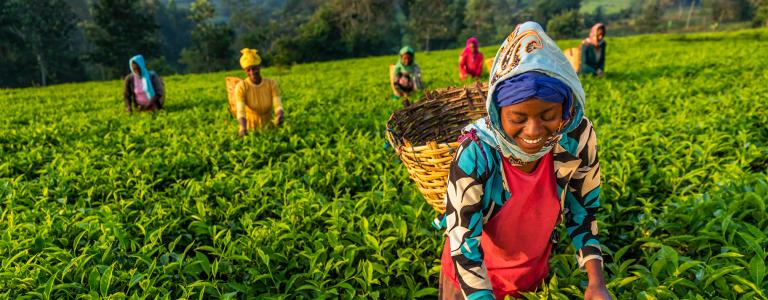IISD Trade and Sustainability Review, December 2024
Trade in Food and Agriculture
This edition of the IISD Trade and Sustainability Review features four unique perspectives from leading experts in trade and agriculture. The authors explore how well-designed agricultural policies and subsidies can promote sustainability in developing and least developed countries.
Read previous issues of the Trade and Sustainability Review here.
Transforming Agricultural Policies Through Agricultural Support and Subsidies in Developing Countries
In late 2021, the UN Food and Agriculture Organization (FAO), the United Nations Development Programme, and the UN Environment Programme called on countries to repurpose their agricultural support and subsidies, including by removing those that are considered the most economically inefficient and potentially the most environmentally harmful. According to the Organisation for Economic Co-operation and Development (OECD), these harmful agricultural policies and support represented almost two-thirds of the USD 629 billion that farmers received in public support and subsidies between 2021 and 2023 in a broad group of countries, including those from the OECD plus a few large developing economies.
However, these figures only paint an overall trend of agricultural support in OECD countries and some large developing economies such as China and India. The picture is completely different in poorer countries and least developed countries (LDCs), where agricultural subsidies are rather limited, and farmers are often penalized through policies designed to guarantee cheap food to their poor consumers.
Given their tight budgets, it is worth asking to what extent repurposing agricultural policies and support is relevant to poorer countries and LDCs that do not, in practice, have much to repurpose. We asked Marco V. Sánchez, who leads the FAO's Monitoring and Analysing Food and Agricultural Policies (MAFAP) program, to answer this question. His piece walks us through the efforts that MAFAP is making in poor countries and LDCs in Africa to optimize their rather limited budgets for food and agriculture—and to share his vision of the potential payoffs that these efforts could yield.
One of the LDCs in which MAFAP has been active is Uganda. We have invited Jane Nalunga and Jonathan Lubega, two agriculture trade experts based in Kampala, to provide us with a full picture of how agricultural policies and support look in Uganda. Finally, three agriculture trade experts from Brazil, Leila Harfuch, Rodrigo Lima, and Gustavo Dantas Lobo, and one from India, Ranja Sengupta, share their views on what has worked—and what could be done better—to ensure that their countries' agricultural support and subsidies promote sustainability.
Happy reading,
Facundo Calvo
Policy Analyst (Trade and Agriculture), IISD
Articles
Optimizing Public Spending on Food and Agriculture: A gamechanger in lower-income countries
FAO's Marco V. Sánchez highlights the need to repurpose agricultural support and policies to transform food systems in lower-income countries.
Read article here.
Agricultural Subsidies in India: A critical balancing act
Ranja Sengupta explores the socio-economic impact of agricultural subsidies in India and underscores the need for effective policy adjustments.
Read article here.
Challenges to Fostering Low-Carbon Agriculture Through Public Policies and Support in Brazil
Leila Harfuch, Rodrigo C. A. Lima, and Gustavo Dantas Lobo examine how low-carbon agriculture policies can balance production with conservation for more sustainable agriculture in Brazil.
Read article here.
Agricultural Subsidies: A case for Uganda
Jane Nalunga and Jonathan Lubega examine Uganda's agricultural subsidies, offering recommendations for redesigning them to foster sustainability.
Read article here.
You might also be interested in
FfD4 Countdown: Strengthening trade policy for sustainable development
The Fourth International Conference on Financing for Development (FfD4) in July 2025 is an opportunity to redefine the role of trade policy frameworks in supporting sustainable and inclusive development.
The State of BCAs 2025
As more countries boost their climate ambition, border carbon adjustments (BCAs) are emerging to curb carbon leakage, with the European Union, the United Kingdom, and others advancing their own mechanisms. This publication is the first of its kind taking stock of this trend.
State of the Sector: Critical energy transition minerals for India
This report presents a comprehensive strategy for securing a reliable supply of critical energy transition materials (CETMs) essential to India's clean energy and low-carbon technology initiatives.
Early-stage screening for responsible investment in agriculture and food systems
The United Nations Food and Agriculture Organization (FAO) and IISD's due diligence tool helps agribusinesses align investments with the Committee on World Food Security's Principles for Responsible Investment in Agriculture and Food Systems (CFS-RAI), guiding early decisions to ensure sustainable and responsible investment.
